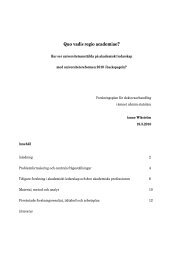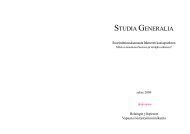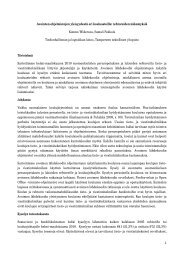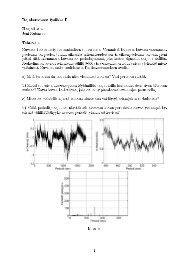the case of the 'urban villas'
the case of the 'urban villas'
the case of the 'urban villas'
You also want an ePaper? Increase the reach of your titles
YUMPU automatically turns print PDFs into web optimized ePapers that Google loves.
Harriet Fertik<br />
Ph.D. candidate, Classical Studies<br />
University <strong>of</strong> Michigan<br />
Privacy and Power in Neronian Rome<br />
Recent studies have considered <strong>the</strong> complex relationship between <strong>the</strong> private life <strong>of</strong> <strong>the</strong><br />
emperor and public affairs. 1 While ancient sources criticize emperors, especially Nero, for<br />
allowing private concerns to influence public business, <strong>the</strong>se critiques do not reflect only on<br />
particular rulers: instead, <strong>the</strong>y demonstrate that <strong>the</strong> emperor’s privacy, or his ability to avoid<br />
scrutiny and act without public consequence, was considered problematic because <strong>of</strong> his<br />
unique role. I focus on Seneca’s De Clementia and <strong>the</strong> Domus Aurea to show how lack <strong>of</strong><br />
privacy became central to <strong>the</strong> understanding <strong>of</strong> absolute power in <strong>the</strong> early imperial period.<br />
The De Clementia and <strong>the</strong> Domus Aurea both draw attention to <strong>the</strong> emperor’s<br />
visibility. For Seneca, an essential difference between ruler and subject is that <strong>the</strong> ruler<br />
cannot escape public view (Clem. 1.8.1-5, 1.15.4); even as <strong>the</strong> ruler acts in <strong>the</strong> gods’ stead<br />
(Clem. 1.1.2), his position subjects him to <strong>the</strong> gaze <strong>of</strong> <strong>the</strong> people he rules. The publicity<br />
endured by <strong>the</strong> powerful is also a <strong>the</strong>me <strong>of</strong> earlier discourse (e.g., Quintus Cicero 44, Velleius<br />
Paterculus 2.14), but <strong>the</strong> singularity <strong>of</strong> <strong>the</strong> emperor’s power amplifies public attention and <strong>the</strong><br />
impact <strong>of</strong> his actions on <strong>the</strong> community. While an imperial residence might <strong>of</strong>fer refuge from<br />
public life (e.g., Tiberius’s retreat to Capri), it could also facilitate <strong>the</strong> emperor’s exposure. It<br />
has been argued that elements <strong>of</strong> <strong>the</strong> Domus Aurea complex (especially <strong>the</strong> Stagnum Neronis<br />
and its porticoes) were designed to resemble a coastal villa and were intended for public use. 2<br />
As a setting for <strong>the</strong> emperor and his subjects to enjoy aristocratic luxury and retreat, <strong>the</strong><br />
Domus Aurea <strong>of</strong>fered access to a part <strong>of</strong> <strong>the</strong> emperor’s life that was traditionally removed<br />
from <strong>the</strong> public sphere. In Seneca’s philosophy and in Nero’s palace, <strong>the</strong> emperor not only<br />
lived in <strong>the</strong> public eye, but could have no truly private life.<br />
1 Kristina Milnor, Gender, Domesticity, and <strong>the</strong> Age <strong>of</strong> Augustus: Inventing Private Life<br />
(Oxford: Oxford University Press, 2005); Aloys Winterling, Politics and Society in Imperial<br />
Rome (Malden: Wiley-Blackwell, 2009).<br />
2 E. Champlin, Nero (Cambridge, MA: Harvard University Press, 2003); A. Carandini, Le<br />
<strong>case</strong> del potere nell’antica Roma (Rome, 2010).

















